Commissioner Hester M. Peirce: "I cannot support a budget and accounting support fee that are designed to support the PCAOB’s current approach to its mission."
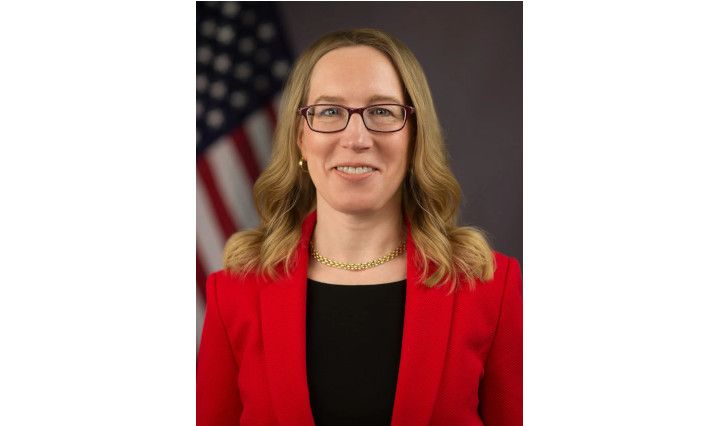
Source: https://www.sec.gov/news/statement/peirce-statement-pcaob-budget-121323
Thank you, Mr. Chair. The Public Company Accounting Oversight Board (PCAOB) opened its doors in 2003[1] to promote “informative, accurate, and independent audit reports.”[2] We sit here, twenty years later, considering the PCAOB’s $385 million budget. We owe it to the public companies and broker-dealers that fund the PCAOB and the investors that rely on the PCAOB to ask how well it is doing its important job, which is why we are having an open meeting on this topic.
One troubling piece of evidence was cited by Chair Williams in an op-ed earlier this year, in which she wrote that: “PCAOB inspectors expect that approximately 40% of the audits they reviewed in 2022 will have had one or more deficiencies, in which the audit firm failed to obtain sufficient appropriate evidence to support its opinion.”[3] What does that startling statistic tell us about how the PCAOB is doing its job? More money may not be the answer. Board member Christina Ho labeled the budget “[g]rowing and [u]nsustainable” and called for the PCAOB “to do a better job of “identify[ing] where inefficiencies exist.”[4] Yet more money is just what the PCAOB is here requesting. After receiving a 13% budget increase last year, the PCAOB is back this year asking for another 10% increase. For perspective, if approved, the 2024 budget will be 41% higher than the 2019 budget. For further perspective, the recent federal debt limit deal would increase discretionary spending by about 4% compared to 2023 outlays.[5]
Instead of a congressional appropriations process, the PCAOB answers only to the Commission. The PCAOB’s 4-page public rationale for its $385 million budget request, which we have before us today, leaves many unanswered questions.[6] I hope that today we can get a better understanding of how the PCAOB weighed the burdens of the accounting support fee on issuers (approximately $331 million) and broker-dealers (approximately $28 million) when putting together the 2023 budget and what efforts it is undertaking to ensure that the PCAOB efficiently uses its resources.
Accordingly, I have a number of questions for Chair Williams and staff from the SEC’s Office of Chief Accountant, which oversees the PCAOB budget process.
Paul, when Congress created the PCAOB, it gave the SEC a role in overseeing its work. Among other things, we can approve or disapprove the budget and accounting support fee and the standards the PCAOB adopts. But the more routine oversight of the PCAOB comes through your office.
Please explain generally what that entails?
Does the unique nature of the SEC-PCAOB relationship lead to the expenditure of duplicative effort in overseeing audit firms?
Erica, trustworthy audit reports contribute to investor confidence and thus are a building block of our capital markets. In an op-ed earlier this year, you described the anticipated 40% of “audit opinions [that] were signed without completing the audit work required to verify the financial statements” in 2022 as “completely unacceptable” and stated that “the responsibility falls on auditors to correct the problems that led to deficiencies in their audits.”[7] The problem is not confined to small firms. As Board member George Botic noted in a recent speech, “The PCAOB staff anticipates the average Part I.A finding rate across the six U.S. Global Network Firms will increase from approximately 20% of audits reviewed in 2021 to 30% in 2022.”[8]
If one paints major deficiencies and foot faults with one brush, the number of deficiencies may not be as informative. Does any part of the increase in the deficiency rate spring from a change in the way PCAOB decides what to include in inspection reports, as opposed to making an informal comment during the inspection process?
As a regulator, the PCAOB would seem to bear some of the responsibility for such widespread failure. What is the PCAOB doing to help audit firms address this problem? Given the unique challenges small firms face, is the PCAOB providing tailored assistance to these firms?
Erica, enforcement is an important tool for a regulator, but it is not the most important tool. You have placed great emphasis on the PCAOB’s enforcement statistics as evidence of the PCAOB’s effectiveness. Earlier this month, for example, you touted the PCAOB’s having “nearly doubled [last year’s] record – with more than $20 million in penalties – the highest yearly total ever imposed by the PCAOB.”[9] The current Strategic Plan struck the goal for enforcement from the 2020-2024 version to “address those issues that pose the greatest risk to investors and are most likely to deter improper conduct,”[10] in favor of taking “[a]ssertive enforcement and meaningful sanctions . . .”[11] Should enforcement stats be the measure by which we assess the PCAOB’s success as an audit regulator?
Erica, the standard-setting regime is, in the words of the PCAOB’s strategic plan, “one of the most ambitious standard-setting agendas in the organization’s history.”[12] While at first blush this may seem positive, an overly active standard-setter can lead to problems down the road as firms retool to comply with those new standards. Gradual standard-setting is the best way to ensure that standard-setters, the public, and firms can devote adequate attention to each standard. With all the new standards you are rolling out, we could see widespread audit deficiencies several years down the road when all these new standards first take effect. Audit quality could suffer if firms are forced to devote more resources to implement new standards and therefore fewer resources for basic quality control measures.
How are you thinking about that particular problem as you set and carry out the standard-setting agenda?
The strategic plan defends this aggressive agenda by arguing that many of the PCAOB’s standards have not been updated since 2003.[13] How has the PCAOB identified the most consequential standards to update and avoided undergoing a lengthy process to update old standards that have been working well?
A former PCAOB staffer raised concerns “that the board and its economic analysis office don’t understand the impacts of its audit standards and whether the benefits outweigh any costs or serve the interests of the American public.”[14] Has the Board ever made a change in a standard-setting project because of its economic analysis? If so, please provide me with an example.
A recent survey of institutional investors by the Center for Audit Quality found support for “modern regulations that balance the value of information with the cost of collecting the information.”[15] These investors understand that more is not always better. How does the PCAOB achieve the right balance?
Paul, how is the Office of Chief Accountant assisting the PCAOB in prioritizing standards, keeping the flow of new standards manageable, and keeping the content of new standards reasonable?
I appreciate that the PCAOB aims to adopt standards that are “clear and scalable, to account for differences in the complexities and sizes of audit firms and the public companies and broker-dealers they audit.”[16]
Where has the PCAOB has done this, particularly to help smaller firms?
How is the PCAOB seeking out feedback from smaller firms, for whom comment letter writing and regular engagement with the PCAOB may not be possible?
Erica or Paul, former Board Member Duane DesPartes said: “As we proceed one by one, I am increasingly concerned that we are establishing new auditor obligations and incrementally imposing new auditor responsibilities in ways that will significantly expand the scope and cost of audit and fundamentally alter the role of auditors.”[17] How do you respond to this concern?
Erica, the 2024 budget document states that 946 employees are needed to “assist the Board in achieving its mandates under the Sarbanes-Oxley Act of 2002.” The PCAOB’s 2019 budget used that same justification for 838 employees. What changed over five years for the PCAOB to justify 108 more employees?
Erica, the 2024 budget requests over $37 million for consulting and professional fees compared to $15 million in 2019. What assurance can you provide that this number will not continue to climb at this steep rate in coming years?
Thank you for that discussion. The PCAOB does much great work, including its continued implementation of the Holding Foreign Companies Accountable Act. I appreciate the hard work and dedication to our capital markets of Chair Williams, the other Board members, and the PCAOB staff. Nevertheless, I cannot support a budget and accounting support fee that are designed to support the PCAOB’s current approach to its mission. The pace and scope of standard-setting and the over-reliance on enforcement as a way to inspire compliance could serve to distract auditors from their essential role in ensuring that investors can rely on financial statements.
[1] Auditing the Auditors: Creating the Public Company Accounting Oversight Board, Securities and Exchange Commission Historical Society, https://www.sechistorical.org/museum/galleries/pcaob/pcaob04a_ground_up_1.php.
[2] Mission, Vision, and Values, PCAOB, https://pcaobus.org/about/mission-vision-values#:~:text=Our%20Mission,accurate%2C%20and%20independent%20audit%20reports.
[3] Chair Erica Williams, We Audit the Auditors, and We Found Trouble, WSJ (Jul. 24, 2003), https://www.wsj.com/articles/we-audit-the-auditors-and-we-found-trouble-accountability-capital-markets-c5587f05.
[4] https://pcaobus.org/news-events/speeches/speech-detail/a-growing-and-unsustainable-budget
[5] See Letter from the Congressional Budget Office to Speaker Kevin McCarthy, Re: CBO’s Estimate of the Budgetary Effects of H.R. 3746, the Fiscal Responsibility Act of 2023 at 14 (May 30, 2023), https://www.cbo.gov/system/files/2023-05/hr3746_Letter_McCarthy.pdf. This number was obtained by comparing the 2024 outlays for the row “CBO’s May 2023 Baseline After Incorporating Statutory Caps on Future Discretionary Funding” compared to outlays for 2023.
[6] Available at https://assets.pcaobus.org/pcaob-dev/docs/default-source/about/administration/documents/fiscal_year_budgets/2024-budget.pdf?sfvrsn=58406b25_2. I am rounding all budget numbers to the nearest million. By comparison, the Commodity Futures Trading Commission’s $411 million Congressional budget request is 78 pages. https://www.cftc.gov/sites/default/files/CFTC_FY_2024_President_Budget_Report.pdf.
[7] Chair Erica Williams, We Audit the Auditors, and We Found Trouble, WSJ (Jul. 23, 2023), https://www.wsj.com/articles/we-audit-the-auditors-and-we-found-trouble-accountability-capital-markets-c5587f05.
[8] Board Member George Botic, Who is Responsible for Audit Quality? (Nov. 28, 2023), https://pcaobus.org/news-events/speeches/speech-detail/who-is-responsible-for-audit-quality.
[9] Chair Erica Williams, Chair Williams to Auditing Profession: “Too Much is At Stake to Let Complacency Win,” PCAOB (Dec. 4, 2023), https://pcaobus.org/news-events/speeches/speech-detail/chair-williams-to-auditing-profession-too-much-is-at-stake-to-let-complacency-win.
[10] Strategic Plan 2020-2024 at 7, PCAOB (Nov. 19, 2020), https://assets.pcaobus.org/pcaob-dev/docs/default-source/about/administration/documents/strategic_plans/strategic-plan-2020-2024.pdf?sfvrsn=776073d3_4.
[11] 2022-2026 Plan at 13.
[12] Strategic Plan 2022-2026 at 10, PCAOB (Nov. 18, 2022), https://assets.pcaobus.org/pcaob-dev/docs/default-source/about/administration/documents/strategic_plans/strategic-plan-2022-2026.pdf?sfvrsn=b2ec4b6a_4 (“2022-2026 Plan”).
[13] Id.
[14] Amanda Iacone, Audit Regulator’s Economic Analysis Lacks Rigor, Ex-Staffer Says, Bloomberg Tax, April 18, 2023, https://news.bloombergtax.com/financial-accounting/audit-regulators-economic-analysis-lacks-rigor-ex-staffer-says.
[15] Perspectives on Corporate Reporting, the Audit, and Regulatory Environment: Institutional Investor Research Findings at 5, KRC Research and the Center for Audit Quality (Nov. 2023), https://www.thecaq.org/wp-content/uploads/2023/11/caq_perspectives-on-corporate-reporting-the-audit-and-regulatory-environment_2023-11.pdf.
[16] 2022-2026 Plan at 10.
[17] Board Member Duane DesParte, Statement on Proposal to Amend PCAOB Auditing Standards Related to a Company’s Noncompliance with Laws and Regulations and Other Related Amendments, PCAOB (Jun. 6, 2023), https://pcaobus.org/news-events/speeches/speech-detail/statement-on-proposal-to-amend-pcaob-auditing-standards-related-to-a-company-s-noncompliance-with-laws-and-regulations-and-other-related-amendments.
What is Hester upset about?:
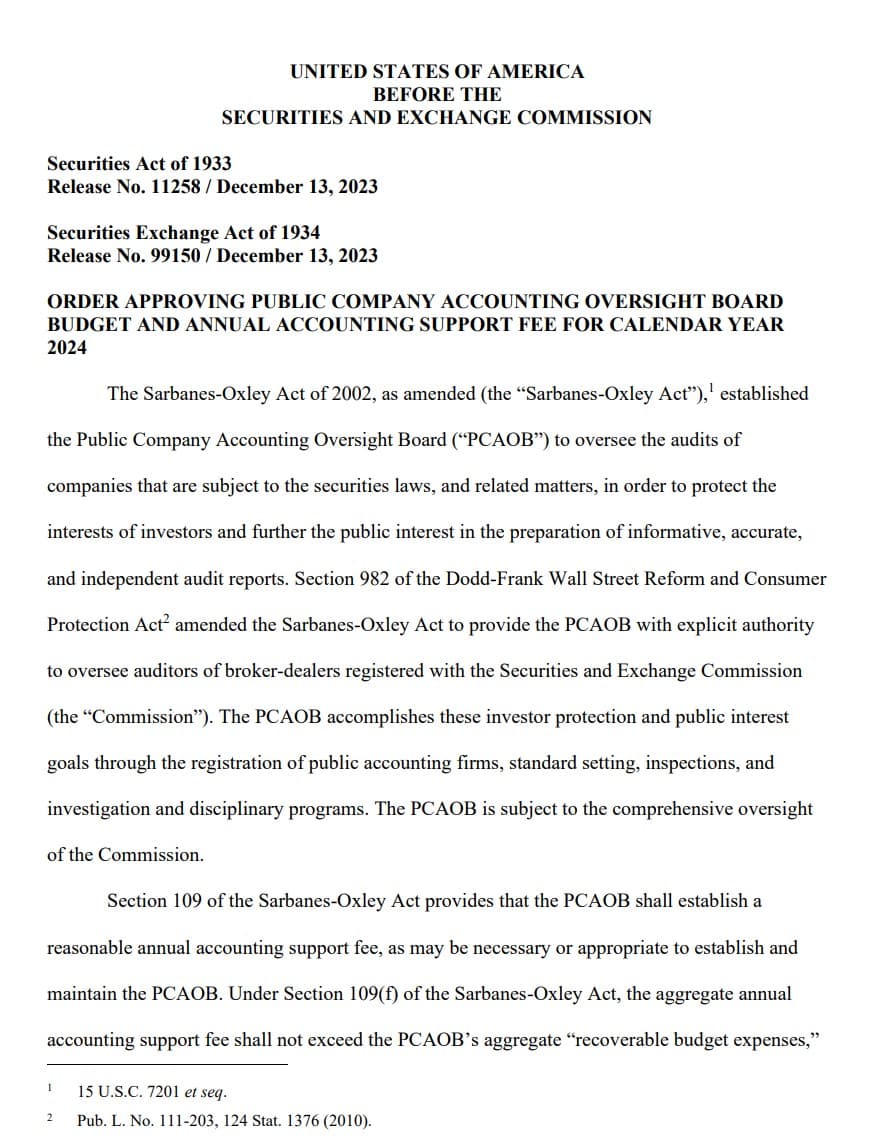
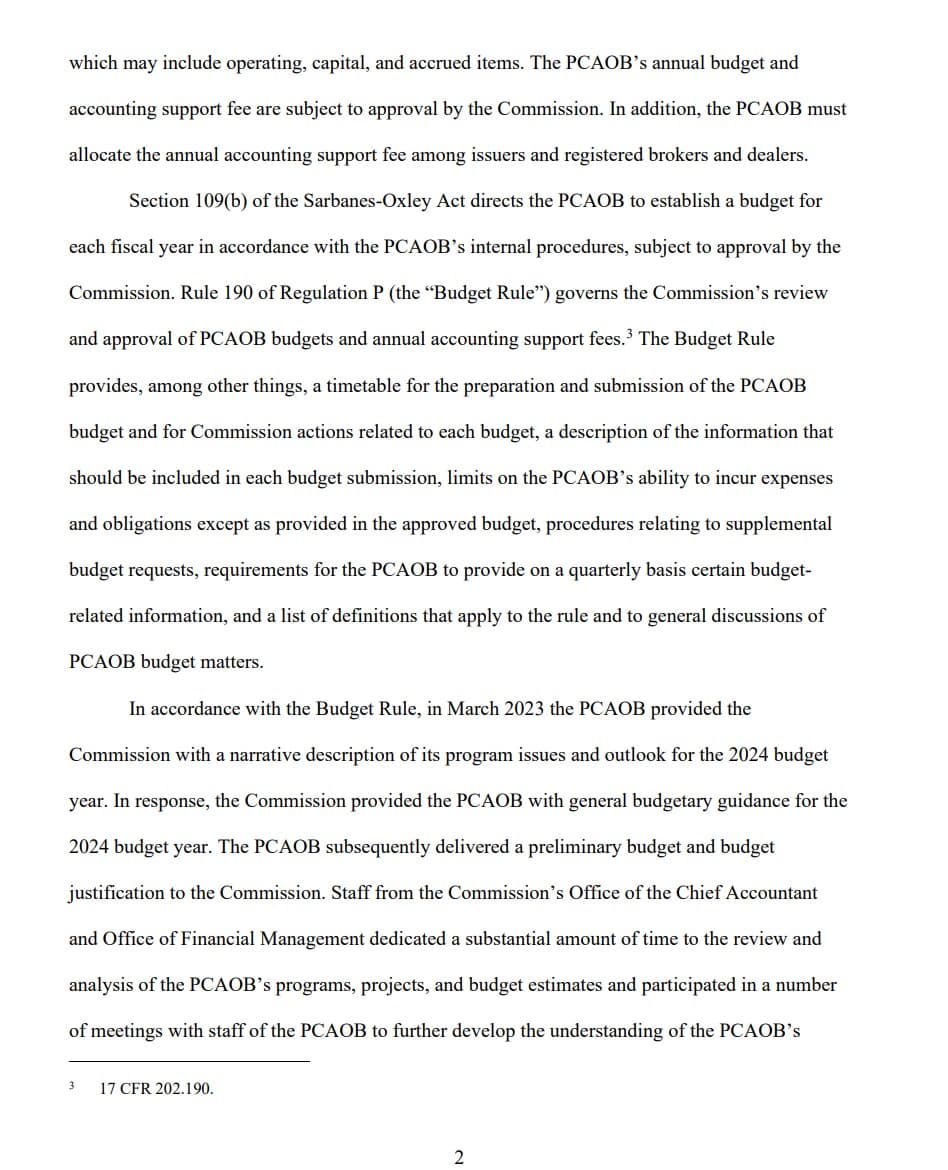
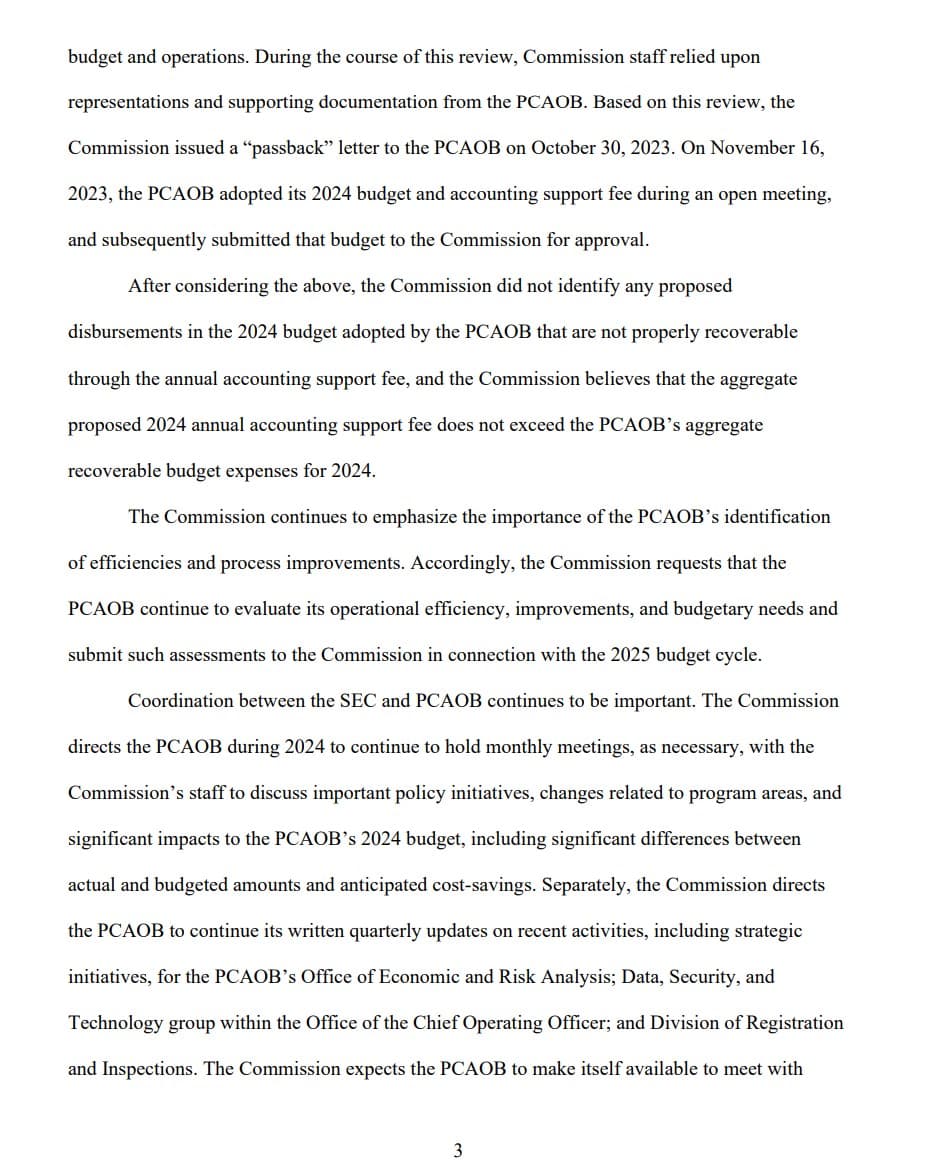
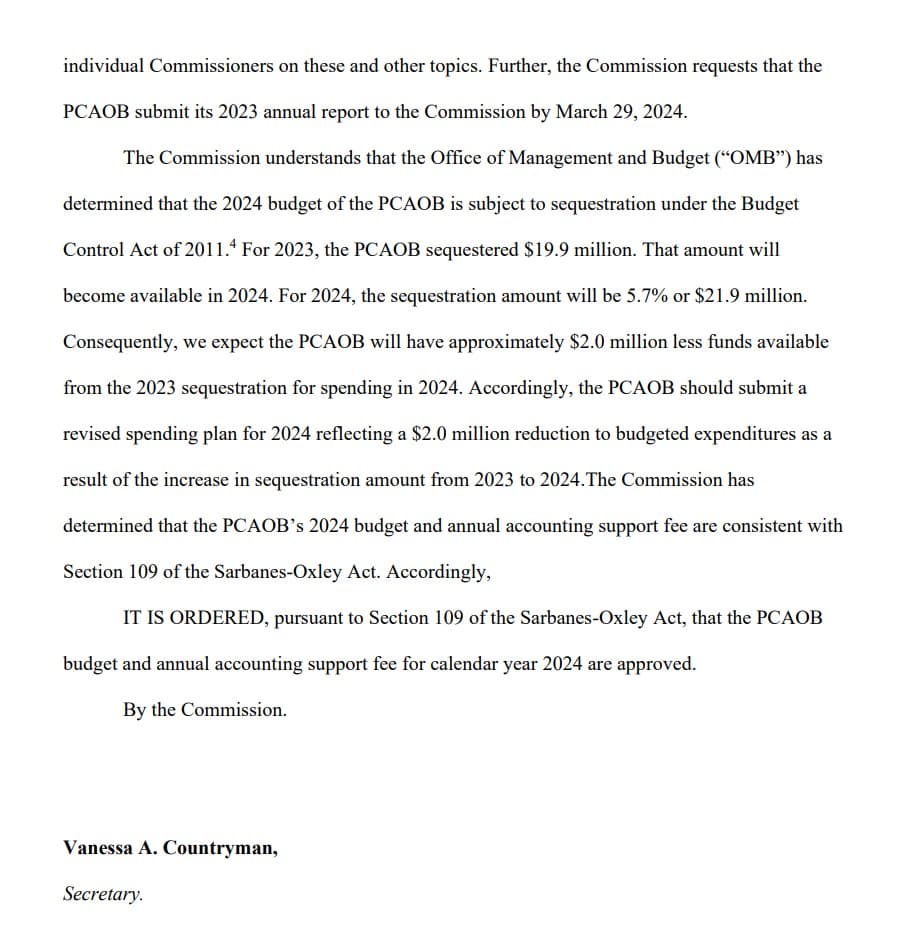
Press Release:
The Securities and Exchange Commission today approved the 2024 budget of the Public Company Accounting Oversight Board (PCAOB) and the related annual accounting support fee. The 2024 PCAOB budget totals $384.7 million, and the accounting support fee totals $358.8 million, of which $331.0 million will be assessed on public company issuers and $27.8 million will be assessed on registered broker-dealers.
“A critical feature of our capital markets is that investors rely on public company disclosures, including their financial results. Essential to investors’ trust in the reliability of such financial information is an independent audit of issuers’ financial statements,” said SEC Chair Gary Gensler. “Congress understood this when they passed the Sarbanes-Oxley Act of 2002 in response to some of the largest accounting frauds and bankruptcies in the history of our country. I support this $385 million budget — supporting a modest two percent increase in headcount — because of the important role the PCAOB plays in protecting investors and facilitating capital formation.”
The Sarbanes-Oxley Act of 2002, which established the PCAOB, provides the Commission with oversight responsibility over the PCAOB. This includes reviewing and approving the PCAOB’s budget and accounting support fee annually.
What is the PCAOB?:
The PCAOB is a nonprofit corporation established by Congress to oversee the audits of public companies in order to protect investors and further the public interest in the preparation of informative, accurate, and independent audit reports. The PCAOB also oversees the audits of brokers and dealers registered with the Securities and Exchange Commission (SEC), including compliance reports filed pursuant to federal securities laws.
The PCAOB has four primary duties:
- Register public accounting firms that prepare audit reports for issuers, and SEC-registered brokers and dealers.
- Establish or adopt auditing and related attestation, quality control, ethics, and independence standards.
- Inspect registered public accounting firms' audits and quality control systems.
- Investigate and discipline registered public accounting firms and their associated persons for violations of specified laws, rules, or professional standards.
In support of our mission, we also conduct economic research and risk analysis, engage with our stakeholders and other domestic and international regulators, and manage a talented workforce and the technology and resources we need to perform our duties.
The SEC has oversight authority over the PCAOB, including the approval of the Board's rules, standards, and budget.

TLDRS:
- The Securities and Exchange Commission today approved the 2024 budget of the Public Company Accounting Oversight Board (PCAOB) and the related annual accounting support fee.
- The 2024 PCAOB budget totals $384.7 million, and the accounting support fee totals $358.8 million, of which $331.0 million will be assessed on public company issuers and $27.8 million will be assessed on registered broker-dealers.
- Commissioner Hester M. Peirce: "I cannot support a budget and accounting support fee that are designed to support the PCAOB’s current approach to its mission."
- "The pace and scope of standard-setting and the over-reliance on enforcement as a way to inspire compliance could serve to distract auditors from their essential role in ensuring that investors can rely on financial statements."



